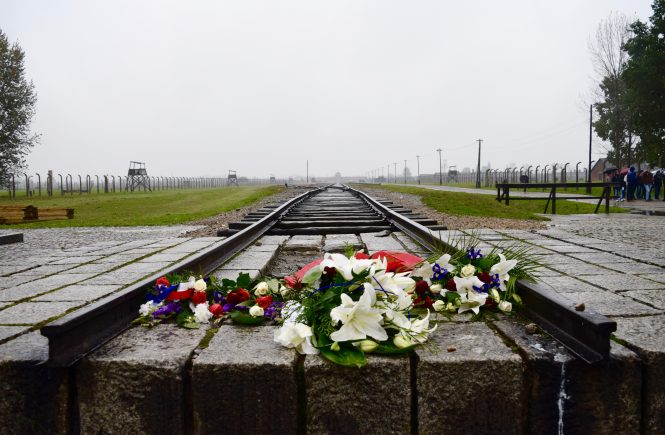There is nothing that can prepare you for an emotional awakening. But when it happens to you, it can change your life.
Prior to visiting Auschwitz, I knew I would experience some strong emotions during my visit to the concentration camps. I just didn’t realize how strong they would be.
We arrived on a freezing, wet, rainy afternoon. And I preferred this. I would feel confused had I experienced something as devastating on a warm, sunny day. Standing on the train tracks at Auschwitz II unable to feel my face or hands, was just a sliver of what it must have felt like years ago when thousands of men and women arrived. It was fitting that the dreadful weather matched the dreadful mood.

Touring both of the camps took over four hours. You can read about the logistics of visiting Auschwitz I & II here. They have done a great job of presenting the information about both camps in a respectful, and yet still extremely powerful way. I could have spent an entire day wandering through Auschwitz.
Reading about the personal stories each individual endured was the hardest part about my visit. Because this wasn’t an exaggerated, mockup of what life might have been like for a certain group of people in history. This wasn’t a movie with highly paid actors and actresses. This was not an excerpt out of a textbook.

This was reality. Right in front of me.
These were human beings, much like myself, of whom were taken out of their daily lives to live as a prisoner.
Witnessing the living conditions, the holding cells, and the gas chambers of these prisoners brought everything into perspective. I would stand there, imagining myself, had I been in their shoes. And it almost brought me to tears.
These people had done nothing to deserve the life they eventually received.

There were moments that I simply voiced out loud, ‘This couldn’t have happened’. Knowing very well that it did. I got chills as I walked past the stone cold building where they performed illegal and highly dangerous medical experiments on women. I tip toed over the train tracks that brought thousands of men, women, and children to the camps, half of which would have died on the journey. I held my stomach as I walked past an entire room filled with real human hair that had been removed from the prisoners before entering the gas chambers. And I had to hold back tears when passing The Black Wall, used solely for lining up prisoners to be shot dead, and placed in front of the brick wall to avoid damaging the brick with bullet holes.

Out of 1.3 million people deported to these camps, 1.1 million were murdered.
I appreciated my life more that afternoon than ever before. All of the heartbreak and hurt that I was experiencing at the time felt so trivial in comparison to the entire lives of these human beings. I was awakened. And I believe visiting these camps saved me in a way.
I simply cannot look at life the same way.
When I think of the things I complain about, I am embarrassed.

‘It’s freezing’ to me, means I have multiple layers on and the tips of my fingers are going numb as I walk through a snow covered dream also known as Central Park.
‘It’s freezing’ to prisoners of Auschwitz, means wearing a measly one-layer uniform living in, essentially, barns outdoors, lacking any type of insulation.

‘I’m starving’ to me, means I haven’t eaten in sixty minutes and a bagel sounds delightful. But only with blueberry cream cheese.
‘I’m starving’ to prisoners of Auschwitz, means literal starvation. In the middle of winter. In Poland. Quite often resulting in death.

‘A bad day’ to me, means missing my subway train, menstrual cramps at work, running out of wine, or hearing from an ex-boyfriend.
‘A bad day’ to prisoners of Auschwitz, means an entire day of work you are unable to do, being separated from family members, wetting yourself at night due to the lack of toilet options, or quite possibly death.

It makes me want to think twice before using such exaggerated language in my daily life. Of course everything is relative and using these phrases is meant to be light-hearted and humorous. But it does make me think about the people all over the world who are actually freezing, starving, and having a really bad day.
I understand there is loads of controversy over taking pictures in such places like concentration camps. While I do agree there are distasteful ways of doing so, I also believe it’s important to share the reality of these horrors. Certain events in history are better explained when they can be seen. Growing up, I better understood my history textbooks when I was given an image of what took place. Similarly to how documentaries and film bring us closer to the actual events that took place.
Of course, the only way to feel the magnitude of Auschwitz is to visit for yourself. And I believe it is important for everyone to do so. As devastating as this period of history was, there are plenty of other moments in time, worldwide, in which we can reflect back with shame, embarrassment, and regret. Making the effort to learn about these tragedies brings empathy, compassion, and understanding into your own life. And the goal is to spread it around using whatever platform you can.
Even if it’s just a simple blog about a girl en route.

